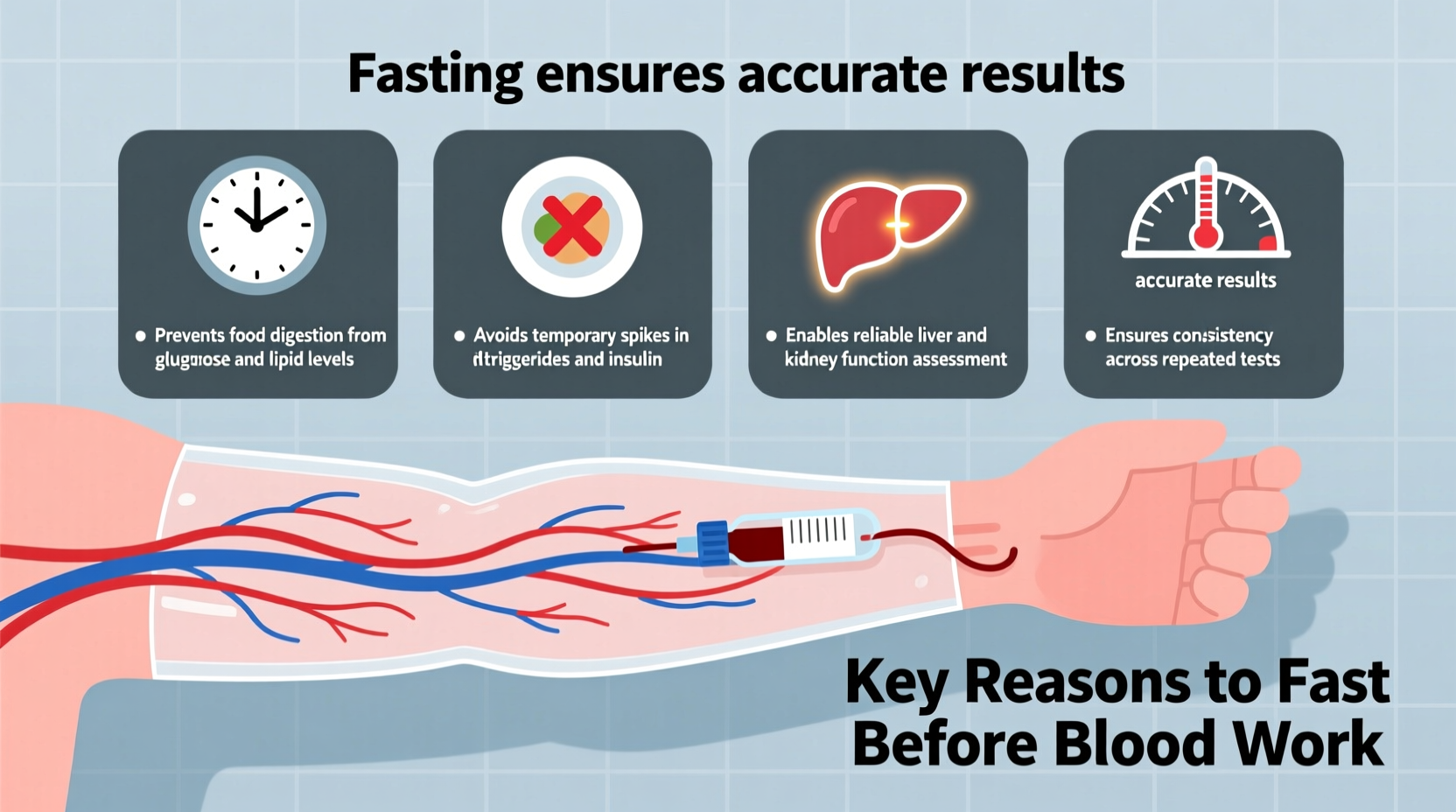Blood tests are among the most common diagnostic tools used in modern medicine. They help doctors assess organ function, detect diseases early, monitor chronic conditions, and evaluate overall health. However, many blood tests require patients to fast for a specific period beforehand. Skipping this step might seem harmless, but it can significantly alter your results and lead to misdiagnosis or unnecessary follow-up testing. Understanding why fasting matters—and how to do it correctly—can ensure your test accurately reflects your body’s true state.
The Science Behind Fasting and Blood Tests

When you eat or drink (except water), your digestive system breaks down food into nutrients like glucose, fats, and proteins. These components enter your bloodstream and temporarily change its composition. For example, eating a meal rich in carbohydrates causes blood sugar levels to spike; consuming fatty foods increases triglycerides and cholesterol readings. These fluctuations are normal and expected after meals, but they interfere with the baseline measurements clinicians need for accurate diagnosis.
Fasting allows your body to return to a metabolic baseline—essentially a \"resting state\"—where nutrient absorption has slowed and circulating substances reflect your usual physiological levels rather than temporary post-meal changes. This is crucial for tests that measure:
- Blood glucose (blood sugar)
- Cholesterol (total, HDL, LDL)
- Triglycerides
- Liver enzymes
- Kidney function markers
Without fasting, elevated levels caused by recent consumption could be mistaken for medical issues such as diabetes, hyperlipidemia, or metabolic syndrome—even when none exist.
“Fasting ensures we’re measuring stable, baseline values—not transient spikes from digestion.” — Dr. Lena Patel, Clinical Pathologist
Common Tests That Require Fasting
Not all blood tests require fasting. Routine screenings like complete blood counts (CBC) or thyroid panels typically don’t need preparation. However, several critical assessments do rely on an 8–12 hour fast. Below is a summary of frequently ordered fasting tests:
| Test Name | Purpose | Fasting Required? | Typical Fast Duration |
|---|---|---|---|
| Fasting Blood Glucose | Diagnose or monitor diabetes | Yes | 8–10 hours |
| Lipid Panel | Measure cholesterol and triglycerides | Yes | 9–12 hours |
| Basic Metabolic Panel (BMP) | Evaluate electrolytes, kidney function, glucose | Sometimes | 8–12 hours (if glucose is being assessed) |
| Insulin Level Test | Assess insulin resistance | Yes | 8–12 hours |
| Vitamin B12 / Iron Studies | Detect deficiencies | Occasionally | 6–8 hours (as directed) |
What Happens If You Don’t Fast?
Breaking your fast—even with a small snack or sugary beverage—can distort results. Here's how:
- Elevated glucose: A single slice of toast or cup of juice can raise blood sugar enough to suggest prediabetes.
- Inflated lipid levels: A handful of nuts or a latte with cream may increase triglycerides by 30–50%, leading to false concerns about heart disease risk.
- Misleading liver enzyme readings: Alcohol or high-fat meals can temporarily elevate liver markers, mimicking signs of liver damage.
In one documented case, a 42-year-old patient drank a protein shake before a scheduled lipid panel. The results showed dangerously high triglyceride levels—over 500 mg/dL. After repeating the test properly fasted, levels dropped to a healthy 140 mg/dL. The initial result had triggered anxiety and prompted plans for medication, which were avoided only because the doctor suspected noncompliance.
“It’s not uncommon to see abnormal results reversed just by ensuring proper fasting. Patient education is half the battle.” — Dr. Marcus Tran, Internal Medicine Specialist
How to Prepare for a Fasting Blood Test: Step-by-Step Guide
To get reliable results and avoid delays in care, follow these steps carefully:
- Confirm instructions: Ask your doctor or lab exactly which tests you're having and whether fasting is required. Note the duration—usually 8 to 12 hours.
- Schedule wisely: Book morning appointments so most of your fast occurs while sleeping. For a 10-hour fast, finish dinner by 8 PM and go to the lab at 6 AM.
- Stick to water: You can drink plain water during the fast. Staying hydrated helps make veins more accessible for drawing blood.
- Avoid hidden sources of calories: No coffee with milk or sugar, no gum, no mints, no juices. Even flavored teas can break your fast.
- Take medications with caution: Most regular medications are safe with water, but check with your doctor—especially if taking corticosteroids, diuretics, or diabetes drugs.
- Stay calm and rested: Avoid intense exercise the night before or morning of the test, as physical stress can affect hormone and enzyme levels.
- Bring identification and paperwork: Arrive early, bring your referral, insurance card, and any required forms.
Debunking Common Myths About Fasting Before Blood Work
Misinformation often leads people to unintentionally compromise their test results. Let’s clarify some frequent misconceptions:
- Myth: “I can drink black coffee—it has no calories.”
Truth: While black coffee is low-calorie, caffeine stimulates metabolism and may affect glucose and cortisol levels. Most labs advise against it. - Myth: “Brushing my teeth will ruin the fast.”
Truth: Toothpaste and mouthwash contain minimal sugar and won’t impact results. Feel free to maintain oral hygiene. - Myth: “One bite of food isn’t a big deal.”
Truth: Even a small amount of food triggers insulin release and nutrient absorption, skewing key metrics.
Checklist: Preparing for Your Fasting Blood Test
Use this checklist the day before your appointment to stay on track:
- ✅ Confirm fasting requirement with your doctor or lab
- ✅ Schedule your blood draw for early morning
- ✅ Finish last meal within recommended window (e.g., 8 PM for a 7 AM draw)
- ✅ Drink only water after starting the fast
- ✅ Avoid alcohol for 24 hours prior (unless otherwise instructed)
- ✅ Continue drinking water to prevent dehydration
- ✅ Take approved medications with small sips of water
- ✅ Get a good night’s sleep
- ✅ Bring necessary documents and ID to the lab
Frequently Asked Questions
Can I drink anything besides water while fasting?
No. Stick strictly to plain water. Beverages like tea, coffee (even black), diet soda, or flavored water may contain compounds that influence test outcomes. When in doubt, ask your healthcare provider.
What if I accidentally eat or drink something?
If you break your fast, inform the lab technician or your doctor immediately. Depending on what and how much you consumed, they may reschedule your test. Honesty prevents misinterpretation of inaccurate results.
Do I need to fast for every blood test?
No. Only certain tests require fasting. CBC, thyroid function, and most hormone panels do not. Always verify based on your specific order. Never assume.
Final Thoughts: Accuracy Starts With Preparation
The importance of fasting before certain blood tests cannot be overstated. It’s a simple step that directly impacts the reliability of your results and, ultimately, the quality of your healthcare. Misleading data due to poor preparation can lead to unnecessary worry, additional testing, or even inappropriate treatment. By understanding the science behind fasting and following clear guidelines, you empower yourself to contribute actively to accurate diagnosis and effective management of your health.









 浙公网安备
33010002000092号
浙公网安备
33010002000092号 浙B2-20120091-4
浙B2-20120091-4
Comments
No comments yet. Why don't you start the discussion?